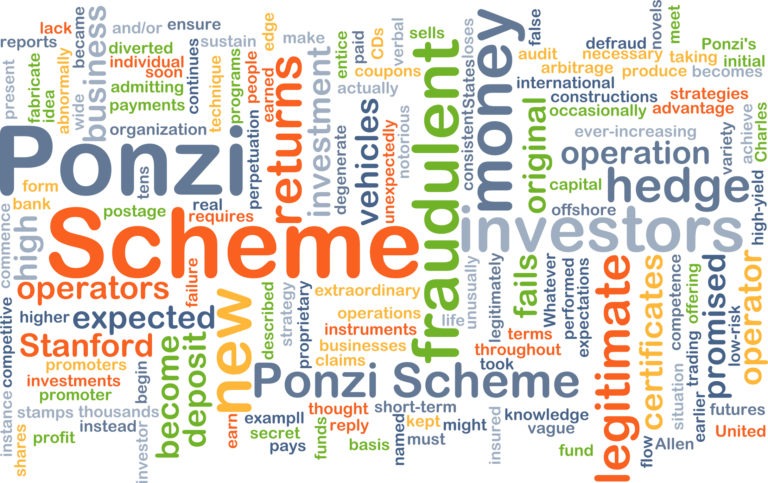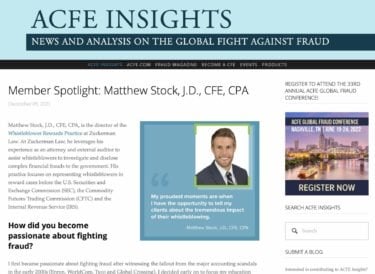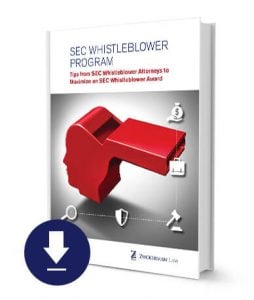Promissory Note Frauds
Fraudsters have recently begun to use promissory notes as vehicles to defraud investors out of billions of dollars. Most promissory note frauds share common characteristics (see “Red Flags for Promissory Note Fraud” below) and follow similar, predictable fact patterns. First, fraudsters raise money by selling promissory notes to investors that offer high, fixed-rate returns with very low levels of risk. Then, instead of using the investors’ money as advertised, fraudsters use the funds to operate large Ponzi schemes in which the money raised from new investors is used to pay the “returns” of earlier investors. Ultimately, promissory note frauds collapse when the fraudsters are unable to raise additional funds from new investors to pay the returns of earlier investors.
While promissory notes can be legitimate investments, those that are marketed and sold broadly to individual investors often turn out to be scams. The U.S. Securities and Exchange Commission (SEC) has recently increased its efforts to root out and halt promissory note frauds. Whistleblowers can assist the SEC in these efforts and earn awards under the Dodd-Frank Act’s SEC Whistleblower Program. Since 2012, the SEC has issued more than $1.2 billion in awards to whistleblowers whose tips have resulted in more than $4.8 billion in financial remedies.
Contact us today to find out the strategies that we have successfully employed to secure SEC whistleblower awards for our whistleblower clients.
SEC Whistleblower Awards for Reporting Promissory Note Frauds
Under the SEC Whistleblower Program, the SEC will issue awards to whistleblowers who provide the SEC with original information about securities law violations, including reports about promissory note frauds, that lead to successful enforcement actions with monetary sanctions in excess of $1 million. In exchange for the valuable information, a whistleblower may receive an award of between 10% and 30% of the total monetary sanctions collected in the action.
The SEC Whistleblower Program protects the confidentiality of whistleblowers and does not disclose information that might directly or indirectly reveal a whistleblower’s identity. A whistleblower can submit an anonymous tip to the SEC if represented by counsel. Experienced SEC whistleblower attorneys can skillfully guide whistleblowers through the process, maximizing the likelihood that their identity is not revealed to unauthorized parties.
Red Flags for Promissory Note Fraud
According to an SEC Investor Alert, investors should be on the lookout for the following red flags for promissory note fraud:
- The promissory note is being marketed to the general public. Promissory notes are marketed almost exclusively to sophisticated and corporate investors. If you are being marketed a promissory note as a member of the general public, it could be a scam.
- There is a promise of above-market returns. Many promissory note frauds offer a high, fixed-rate return (up to 15 or 20 percent) with a very low level of risk. If the investment sounds too good to be true, it likely is.
- The promissory note is short-term. Promissory note scams frequently offer above-market returns on short-term notes.
- The seller claims the promissory note is “risk-free,” “guaranteed,” or “insured.” All investments carry some level of risk, and investments with higher returns have a higher risk. Fraudsters will often claim that promissory notes are risk-free, guaranteed, or insured.
- The promissory note is not registered. Promissory notes with a term of over nine months must be registered with the SEC and the states in which they are being sold.
- The seller is not properly licensed. Insurance agents and brokers must have a securities license to sell promissory notes. You can look up whether the seller is properly licensed with the SEC.
As detailed below, these red flags are consistently present in the SEC’s enforcement actions against promissory note frauds. For more information on promissory note scams, see FINRA’s Investor Alert.
Recent SEC Enforcement Actions Against Promissory Note Frauds
SEC v. 1 Global Capital LLC and Carl Ruderman
On August 29, 2018, the SEC filed charges against 1 Global Capital LLC and its former CEO, Carl Ruderman, for allegedly defrauding 3,400 retail investors in a $322 million promissory note fraud. According to the SEC’s complaint, 1 Global promised investors a “high-return, low-risk investment” in which 1 Global would use investor money to make short-term loans to small and medium-sized businesses, known as Merchant Cash Advances. Instead of using investor money as marketed, 1 Global made make Ponzi scheme-like payments to early investors from the sales of the promissory notes and Ruderman misappropriated millions of dollars for his own uses.
SEC v. Gina Champion-Cain and ANI Development, LLC
On August 29, 2019, the SEC filed charges against ANI Development, LLC and its principal Gina Champion-Cain for operating a multi-year $300 million promissory note fraud. According to the SEC’s complaint, Champion-Cain claimed to offer investors the opportunity to make short-term, high-interest loans (between 15% and 25%) to individuals and entities seeking to obtain California liquor licenses. In truth, that investment opportunity was a sham and Champion-Cain used the investors’ money to fund her failing business ventures.
On March 31, 2021, Champion-Cain was sentenced in federal court to 15 years in prison for masterminding the massive, years-long Ponzi scheme and obstructing justice by hiding and destroying evidence from federal investigators.
SEC v. Philip E. Riehl
On January 31, 2020, the SEC charged Philip E. Riehl with operating a $60 million promissory note scam that targeted Amish and Mennonite communities by making false claims about the use of their funds and guaranteed returns. According to the SEC’s complaint, the defendant raised money by selling promissory notes to community members, which he claimed would be used to make loans to other community members who wanted to borrow money, typically to finance the borrowers’ businesses or real estate purchases. The defendant failed to disclose certain known risks associated with the notes to investors. Additionally, the defendant misappropriated investor funds. As a result, the defendant was unable to pay back investors, despite his personal guarantee to repay their notes.
SEC v. Clarence Dean Alford
On July 30, 2020, the SEC charged former Georgia state legislator Clarence Dean Alford with defrauding at least 100 investors in a $23 million promissory note scheme. According to the SEC’s complaint, the defendant raised money by selling high-yield promissory notes (ranging from 12 percent to 34 percent annual rates of return) purportedly issued by his energy development company, Allied Energy Services LLC. The defendant claimed that the funds would be used to finance energy projects. Instead, the defendant used most of the funds to operate a Ponzi scheme, by making interest payments to earlier investors from new investor funds, and for personal expenses. In 2019, the defendant’s alleged scheme collapsed when he failed to make promised interest payments to several investors and then failed to repay the investors’ principal.
SEC v. MJ Capital Funding, LLC, MJ Taxes and More Inc, and Johanna M. Garcia
On August 13, 2021, the SEC filed an emergency action to stop an alleged Ponzi scheme that raised between $70.9 million and $128.8 million from more than 2,150 investors through a promissory note fraud. According to the SEC’s complaint, MJ Capital told investors that their money would be used to fund small business loans called “merchant cash advances,” and promised investors annual returns of 120% to 180%. In fact, MJ Capital only made $2.9 million in merchant cash advance loans and earned very little in revenue. In order to keep the fraud from collapsing, the defendants used at least $20 million of new investor money to pay purported “returns” to existing investors in a classic Ponzi scheme fashion. Additionally, the defendants misused another $27.4 million of investor funds by making payments to various other entities, a substantial portion of which represented payments to sales agents for promoting these investments.
The SEC’s emergency motion for a temporary restraining order (below) notes that, on April 10, 2021, an individual registered a domain name very similar to MJ Capital’s website and published content alleging that MJ Capital was operating a Ponzi scheme. The defendants responded to the allegations by suing the individual who had created the website. The defendants’ cover-up efforts were successful, and in the months after the appearance of the website accusing MJ Capital of operating a Ponzi scheme, MJ Capital continued to raise ever-increasing amounts of investor money. Specifically, MJ Capital raised between $19.8 million and $61.1 million between May 1 and June 30, 2021.
SEC v. MJ Capital Funding, et alHow to Report Promissory Note Fraud to the SEC
To report promissory note fraud and qualify for an award under the SEC Whistleblower Program, the SEC requires whistleblowers or their attorneys to report their tips online through the SEC’s Tip, Complaint, or Referral Portal or mail/fax a Form TCR to the SEC Office of the Whistleblower. Prior to submitting a tip, whistleblowers should consider scheduling a confidential consultation with an experienced SEC whistleblower attorney. The path to receiving an award is lengthy and complex. SEC whistleblower attorneys can provide critical guidance to whistleblowers throughout this process to increase the likelihood that they not only obtain, but maximize, their awards.
SEC Whistleblower Attorneys
If you have original information that you would like to report to the SEC Whistleblower Office, contact the Director of our SEC whistleblower practice at [email protected] or call our leading SEC whistleblower lawyers at (202) 930-5901 or (202) 262-8959. All inquiries are confidential.
The law firm’s SEC whistleblower attorneys will work to quickly provide SEC whistleblowers with the highest-quality representation. In conjunction with our courageous clients, we have helped the SEC halt multi-million dollar investment schemes, expose violations at large publicly traded companies, and return funds to defrauded investors.






In contrast to many other SEC whistleblower law firms, our team includes a Certified Public Accountant and Certified Fraud Examiner with substantial experience auditing public companies and investigating complex fraud schemes. In addition, two lawyers on our team served in senior positions at the U.S. Office of Special Counsel overseeing government investigations of whistleblower claims. We understand the many challenges that the SEC faces in investigating our clients’ disclosures and take measures to increase the likelihood that the SEC will be able to effectively pursue the disclosures we provide on behalf of our clients.
Recently the Association of Certified Fraud Examiners published a profile of Matt Stock’s success working with whistleblowers to fight fraud:
For more information about SEC whistleblower awards, download our eBook:
Promissory Note Fraud SEC Whistleblower Lawyers
How to Qualify for an SEC Whistleblower Bounty
- See our column in Forbes: One Billion Reasons Why The SEC Whistleblower-Reward Program Is Effective.
- See our column in Going Concern: Sarbanes-Oxley 15 Years Later: Accountants Need to Speak Up Now More Than Ever.
- See our post in Accounting Today: Whistleblower Protections and Incentives for Auditors and Accountants.
- See our post in The Compliance and Ethics Blog: Shkreli Trial Reveals the Challenges Faced by Compliance Whistleblowers.
Are Whistleblowers Protected from Retaliation?
Click here to learn more about anti-retaliation protections for SEC whistleblowers under the Dodd-Frank Act and Sarbanes-Oxley Act.





